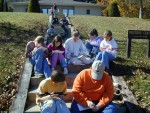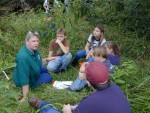The Coweeta LTER Program has a long history of formal and informal outreach to user groups in local, national, and international communities. Our outreach includes:
- Tours guided by scientists and technical staff as well as schoolyard activities for students and teachers at several grade levels
- Training of undergraduate, graduate, and post-doctoral scientists
- Distribution of technical and general ecological information from our web site, from publication reprints, and from products directed towards the general public such as brochures, maps, and magazine articles.
Scientists and staff at Coweeta Hydrologic Laboratory provide guided scientific field and laboratory tours for a wide variety of audiences on topics including ecosystem function, stream biology, vegetation management, water quality and yield, and forest road design and construction.
The Coweeta LTER Program continues its long tradition of training undergraduate, graduate, and post-doctoral scientists. The financial support for these scientists varies from full graduate research stipends to providing study sites, equipment, vehicles, and/or housing that are purchased, managed, and/or maintained with Coweeta LTER funding.
We continue to distribute electronic data and information through our web site to scientists within and outside the Coweeta LTER Program, to students, and to the general public. Use of the Coweeta web site has more than doubled each year since going online in 1995 and in 2001 received 417,761 hits from 33,225 computers. In addition to the distribution of digital sources, we will continue to distribute on demand publication reprints, maps, and popular magazine articles.
The Coweeta Schoolyard Education Program includes projects with middle school, high school, and community college students. These programs range from structured activities with sixth grade students to data collection that is lead by teachers (after training by Coweeta staff) at the high school level, to student inquiry-based learning at the community college level.
The sixth graders meet with Coweeta researchers on eight Saturdays during the school year to actively participate in ongoing research. A group of eighteen students, along with their three teachers, meet for half-day sessions to gather data on diverse topics such as riparian zone restoration, forest productivity, climate and weather, and stream macroinvertebrates. Following introduction and discussion, the students collect data, which includes making vegetation stem counts, collecting leaves from litter traps, inventorying stream macroinvertebrates, or measuring tree stem respiration. The students are closely supervised for accuracy, understanding of scientific methods, and usage of specialized equipment. Each of the students keeps a field book to chronicle their activities, observations, new terminology, and conclusions about each project.
The high school teachers are leading research projects that are related to ongoing Coweeta studies. For example, students monitored the effects of restoration on a portion of two streams that are on their school property. After restricting cattle access to the streams, a fecal coliform study was conducted by Coweeta researchers. Four years later, the high school students remeasured the fecal coliform in the recovery area to monitor the effects of the riparian zone recovery. Coweeta staff provided initial equipment and training and the students and their teacher ran subsequent measurements.
A study to promote inquiry-based learning for community college students is led by Deanne Oppermann, instructor at Southwestern Community College, and Brian Kloeppel. Students assist in the measurement of tree stem respiration on three sites that vary in topographic position within a watershed. In addition, students review online data from the same three sites that have been collected by previous students. The students are then asked a series of leading questions to promote their understanding of the controls on tree stem respiration. Students are required to use the data and equipment available to them to prove or refute their hypotheses. A written project report is used to assess students on their understanding of the controls on tree stem respiration and forest carbon cycling.
Education and Outreach on the WWW

 Enlarge this image
Enlarge this image
